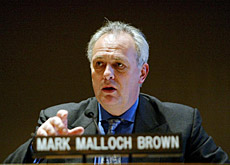
UNDP chief points the finger at Switzerland

The United Nations Development Programme head, Mark Malloch Brown, has slammed Switzerland over the size of its official development-aid budget.
Malloch Brown argued that the country was cutting its contributions at a time when others were doing the opposite.
He issued a “warning” to the Swiss authorities, in particular parliament, during a visit to Bern on Monday.
He told them that Switzerland had still not achieved its often-stated goal of contributing 0.4 per cent of gross domestic product (GDP) to development aid.
Malloch Brown, who was earlier this year named chief of staff by UN Secretary-General Kofi Annan, made his criticism after a meeting with the head of the Swiss Agency for Development and Cooperation (SDC), Walter Fust.
He also met senior officials at the foreign ministry and members of the foreign policy committees of the House of Representatives and the Senate.
Generous contributor
Malloch Brown stressed that Switzerland, traditionally a generous contributor, was the only country apart from Japan that had reduced its development aid.
The trend, he said, was the reverse in many other countries, with some already having reached the 0.7 per cent level fixed by the UN in 1970.
In 2003, Switzerland contributed 0.38 per cent of GDP to development aid, a sum of SFr1.719 billion ($1.44 billion). But, with the authorities carrying out cost-cutting measures, that share could go down to 0.35 per cent in 2008.
The UNDP administrator said he wished that Switzerland would fix a new goal in view of a summit scheduled for September in New York that is to discuss the “Millennium Objectives” formulated by the world body in 2000.
These aim in particular at reducing poverty by half by the year 2015.
Big interest
“Switzerland has a big interest in being the home of the future Human Rights Council, a body that Bern has suggested should replace the Human Rights Commission,” Malloch Brown commented.
“It would be surprising if Switzerland breaks free from the international consensus now when it comes to development aid,” he insisted.
Fust stressed that fixing a new goal for Swiss contributions was a political decision that would be examined on May 18 at a special government session devoted to foreign policy.
In an interview in the SonntagsBlick newspaper, Foreign Minister Micheline Calmy-Rey indicated that the government had to take decisions on both the Millennium Objectives and on UN reforms.
Answering the UNDP head’s criticism, Fust underlined that some countries reverted to “cosmetic” tricks to improve their contribution percentage, for example by including money spent on asylum seekers as development aid.
Fust commented that if Switzerland were to play such tricks, it would also reach the current objective of 0.4 per cent of GDP.
However, he said that was no excuse for not paying more.
swissinfo with agencies
In 2005, total annual Swiss aid to the UNDP amounted to SFr52 million, making Switzerland one of the top ten donor countries.
The SDC and the UNDP collaborate directly on the country level where the SDC supports projects in the fields of environment management, crisis recovery and the decentralisation of government structures.
The number of Swiss working at the UNDP has doubled over the past two years. Today, there are about 20 Swiss citizens working for the UNDP in different areas.
In 2004, worldwide official development aid to developing countries increased by 4.6 per cent in real terms compared with 2003, mainly because of aid given to Iraq and Afghanistan.
The amount donated by the world’s 22 richest countries totalled $78.6 billion in 2004, which represented 0.25 per cent of their combined gross national income.
The United States remains the highest donor in terms of actual money, followed by Japan, France, Britain and Germany. Switzerland comes in 15th position.
Only Denmark, Luxembourg, Norway, the Netherlands and Sweden have reached the aim of 0.7 per cent of GDP fixed by the UN in 1970.

In compliance with the JTI standards
More: SWI swissinfo.ch certified by the Journalism Trust Initiative






























You can find an overview of ongoing debates with our journalists here . Please join us!
If you want to start a conversation about a topic raised in this article or want to report factual errors, email us at english@swissinfo.ch.